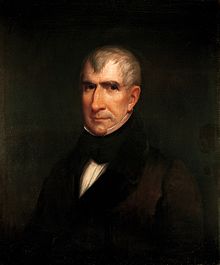
Back William Henry Harrison Afrikaans ዊሊያም ሄንሪ ሀሪሰን Amharic William Henry Harrison AN Willelm Henric Harrison ANG ويليام هنري هاريسون Arabic ويليام هنري هاريسون ARY ويليام هينرى هاريسون ARZ William Henry Harrison AST विलियम हेनरी ह्यारिसन AWA Vilyam Henri Harrison Azerbaijani
William Henry Harrison | |
|---|---|
 1835 portrait | |
| 9th President of the United States | |
| In office March 4, 1841 – April 4, 1841 | |
| Vice President | John Tyler |
| Preceded by | Martin Van Buren |
| Succeeded by | John Tyler |
| United States Minister to Gran Colombia | |
| In office February 5, 1829 – September 26, 1829 | |
| President | |
| Preceded by | Beaufort Taylor Watts |
| Succeeded by | Thomas Patrick Moore |
| United States Senator from Ohio | |
| In office March 4, 1825 – May 20, 1828 | |
| Preceded by | Ethan Allen Brown |
| Succeeded by | Jacob Burnet |
| Member of the Ohio Senate from the Hamilton County district | |
| In office December 5, 1819 – December 2, 1821 | |
| Preceded by | Ephraim Brown |
| Succeeded by | Ephraim Brown |
| Member of the U.S. House of Representatives from Ohio's 1st district | |
| In office October 8, 1816 – March 3, 1819 | |
| Preceded by | John McLean |
| Succeeded by | Thomas R. Ross |
| 1st Governor of the Indiana Territory | |
| In office January 10, 1801 – December 28, 1812 | |
| Appointed by | John Adams |
| Preceded by | Office established |
| Succeeded by | Thomas Posey |
| Delegate to the U.S. House of Representatives from the Northwest Territory's at-large district | |
| In office March 4, 1799 – May 14, 1800 | |
| Preceded by | Constituency established |
| Succeeded by | William McMillan |
| 2nd Secretary of the Northwest Territory | |
| In office June 28, 1798 – October 1, 1799 | |
| Governor | Arthur St. Clair |
| Preceded by | Winthrop Sargent |
| Succeeded by | Charles Willing Byrd |
| Personal details | |
| Born | February 9, 1773 Charles City County, Virginia, British America |
| Died | April 4, 1841 (aged 68) Washington, D.C., U.S. |
| Cause of death | Enteric fever |
| Resting place | Harrison Tomb State Memorial |
| Political party |
|
| Spouse | |
| Children | 10, including John, 2 with Dilsia, including Marie Harrison |
| Parent |
|
| Relatives | Harrison family of Virginia |
| Education | |
| Occupation |
|
| Awards | |
| Signature | |
| Military service | |
| Branch/service |
|
| Years of service |
|
| Rank | Major general |
| Unit | Legion of the United States |
| Commands | Army of the Northwest |
| Battles/wars | |
William Henry Harrison (February 9, 1773 – April 4, 1841) was the ninth president of the United States, serving from March 4 to April 4, 1841, the shortest presidency in U.S. history. He was also the first U.S. president to die in office, causing a brief constitutional crisis since presidential succession was not then fully defined in the U.S. Constitution. Harrison was the last president born as a British subject in the Thirteen Colonies, and was a member of the Harrison family of Virginia. He was a son of Benjamin Harrison V, a U.S. Founding Father, and was the grandfather of Benjamin Harrison, the 23rd U.S. president.
In 1794, he participated in the Battle of Fallen Timbers, an American military victory that ended the Northwest Indian War. In 1811, he led a military force against Tecumseh's confederacy at the Battle of Tippecanoe, where he earned the nickname "Old Tippecanoe". He was promoted to major general in the Army during the War of 1812, and led American infantry and cavalry to victory at the Battle of the Thames in Upper Canada.
Harrison's political career began in 1798, with an appointment as secretary of the Northwest Territory. In 1799, he was elected as the territory's non-voting delegate in the U.S. House of Representatives. He became governor of the newly established Indiana Territory in 1801 and negotiated multiple treaties with American Indian tribes, with the nation acquiring millions of acres. After the War of 1812, he moved to Ohio where, in 1816, he was elected to represent the state's 1st district in the House. In 1824, he was elected to the U.S. Senate, though his Senate term was cut short by his appointment as minister plenipotentiary to Gran Colombia in 1828.
Harrison returned to private life in Ohio until he was nominated as one of several Whig Party nominees in the 1836 U.S. presidential election, in which he lost to Democratic vice president Martin Van Buren. In the 1840 presidential election, the party nominated him again, with John Tyler as his running mate, under the campaign slogan "Tippecanoe and Tyler Too", and Harrison defeated Van Buren. Just three weeks after his inauguration, Harrison fell ill and died days later. After resolution of an ambiguity in the constitution regarding succession to the powers and duties of the office, Tyler became president. Harrison is remembered for his Indian treaties, and also his inventive election campaign tactics. He is often omitted in historical presidential rankings due to the brevity of his tenure.